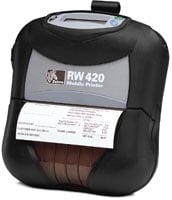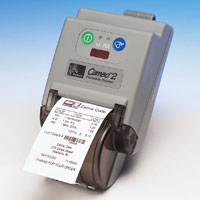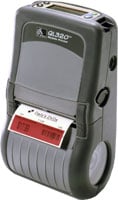Jumbo Chooses Zebra Label Printers to Improve Customer Service
 Jumbo is the largest toy retailer in Greece and customer service is at the top of its business agenda. Every day, hundreds of customers buy goods from its 35 stores. The company has an excellent reputation for offering the broadest selection of toys in the market at the best prices.
Jumbo is the largest toy retailer in Greece and customer service is at the top of its business agenda. Every day, hundreds of customers buy goods from its 35 stores. The company has an excellent reputation for offering the broadest selection of toys in the market at the best prices.
Customer service, reducing costs and improving productivity are key factors in helping Jumbo to drive and expand its business, and to achieve this, Jumbo recently decided to automate its labelling, price control and stock replenishment procedures.
Previously, such procedures were handled by a central PC workstation connected to a thermal printer in each store. Periodical stock replenishment was carried out manually by employees, who checked the shelves and recorded depleted items. This data was entered again manually into the workstation, and the stock replenishment list printed and forwarded to the outlet’s warehouse. Labels advertising prices, promotions and offers were arranged on the workstation, and printed on a thermal printer. When new stock was placed on the shelves, employees had to take the printed labels, go to the respective shelves and place them under the right items.
Introduction of mobile printers
Jumbo was already very familiar with automation, having first installed automated print procedures in 1996. However, to meet its key business objectives, Jumbo identified that it needed a faster and more flexible mobile printing application. The company was forced to seek a new supplier to help it achieve this, and turned to leading manufacturer of on-demand printing solutions, Zebra Technologies. Subsequently, Jumbo upgraded its stock replenishment system with Zebra QL 420 mobile printers.
Jones Dairy Farm Empowers Delivery Drivers with Wireless Computers, Printers
Challenge
Since Milo Jones sold his first sausage in 1889, the Jones Dairy Farm has been making great sausage in Fort Atkinson, Wisconsin, from a cherished family recipe. Today, six generations later, the Jones family still operates the original farm and maintains its high quality standards.
However, the company’s distribution has grown considerably. It now sells its products online, in stores across the country, as well as in Canada, Japan and Hong Kong. The innovative company was the first in the meat industry to quick-freeze, one of the first to introduce fully-cooked breakfast sausage, and was early to operate a modern bacteriological chemical laboratory.
More recently, Jones Dairy decided to implement a direct store delivery (DSD) application with elements of route accounting for enhanced efficiency and customer service. Previously, Jones Dairy delivery staff had to go back and forth to their trucks to gather and print data for transactions, relying on manual entry using pen and paper forms.
Solution
Jones Dairy coupled Motorola® MC70 mobile computers with Zebra’s RW 420 mobile printers.
Mobile Printing Enables Charter Baking Company to Deliver the Freshest Organic Baked Goods On-time to Consumers Nationwide
Challenge
Headquartered in Boulder, Colorado, Charter Baking Company, a portfolio company of Charterhouse Group, Inc. and North America’s leading supplier of natural and organic bread and baked goods, is dedicated to bringing consumers a variety of the finest natural and organic breads without the use of any artificial ingredients or preservatives. The company distributes branded products from Rudi’s Organic Bakery, The Vermont Baking Company, The Baker, and Matthew’s Bread to supermarkets, mass retailers and a host of independent natural food stores across the U.S. In order to continue to ensure the freshness of its products, Charter Baking wanted to make sure all products were delivered accurately and on-time to meet its customers’ needs.
In 2007, Charter reached out a leading provider of handheld and host software to the route distribution and food processing industries. The company began its relationship when it bought Vermont Bakeries.
“We had been using a variety of disparate route accounting systems in various locales, including manual systems, and we were lacking the real-time visibility of inventory and sales data that could help us plan production for maximum sales, profitability and customer service,†said Andy Artzer, CIO of Charter Baking Company.
“Manual transactions at the store delivery level slowed down drivers’ productivity and efficiency and were a hindrance to our growth. In addition, the lack of real-time sales/inventory information and sales integration with our back-office planning system made forecasting and production planning a challenge. As a result, we experienced higher return rates in some regions or stores and out-of-stocks in others. Now, with the new system we can do more accurate forecasting by region and by store.â€
Based on its needs, Charter Baking selected a sales tracking, ordering, route settlement, mobile/wireless route accounting/direct-store-delivery solution. The application runs on any Microsoft Windows Mobile device and the Charter Baking implementation utilizes Motorola MC9090 rugged mobile computers with a keypad designed specifically for DSD and Zebra RW 420 mobile/wireless receipt printers. Transaction data from each route is uploaded
daily into Charter’s host system application called “Bakers Dozenâ€.
“We specified Zebra’s mobile technology as a result of an evaluation our company conducted on mobile printers in the marketplace, in which Zebra ranked highest on its usability, rugged construction, printing quality and superior battery life,†explains Artzer. “With the old system it was difficult to decipher the drivers’ handwriting. Now, with the mobile printers, all the printouts are clear and legible.â€
Using the handheld mobile/wireless solution, Charter’s drivers can complete delivery route transactions quickly and conveniently. With the mobile computer and printer, Charter’s mobile workers can issue invoices, print receipts, collect signatures, enter credits for returns and accept payments on the spot, then communicate these transactions to the host system. Product and quantity data can be entered either by scanning the product’s UPC code or entering the number into the handheld.
“Implementing the system has helped us streamline delivery operations for drivers and provides us with significantly greater accountability and accuracy on product sales across all locations,†states Artzer. “As a result, we can identify and optimize sales opportunities and ensure that production, distribution and product placement are done in the most advantageous manner to serve our customers.â€
Heineken Spain Chooses Zebra For Printing Invoices and Receipts
 The challenge
The challenge
Previously drivers used either handwritten or printed carbon paper forms, making the creation of new documents slow and difficult. This caused a multitude of complaints due to errors or problems reading the documents.
The Objectives
The main purpose of the project was to speed up the distribution process and enable distributors to correct orders when making deliveries, preventing errors when creating the document and during the final invoicing process. In addition, SIH wanted to increase the quality of its printed receipts and invoices printed on mobile printers and reduce the cost of excessive paper consumption.
The Solution
Using Zebra QL 420TM and RW 420TM wireless mobile printers along with Symbol MC9060 terminals, orders can now be corrected during delivery. It is now possible to make changes and print on demand without wasting paper. Thanks to this new process, the distributor now has a record of all the work carried out en route during the course of the day. This is achieved by uploading data to the central system using a Symbol terminal.
Mobile Printing Keeps Productivity Percolating at Green Mountain Coffee Roasters
- Forklift-mounted mobile printers cut travel time, reduced labeling errors, and increased throughput in the DC.
- Updated printing operations lowered supply costs.
- Driven natively from within PeopleSoft and other leading ERP software packages, Zebra printers’ ease of integration saves considerable time and costs.
- Four different types of Zebra printers are now used to handle various tasks through- out the company, all sharing a common printer language for ease of support and to share label formats.
- Zebra’s rugged and reliable printers support the broadest range of wireless security standards.
Challenge
Green Mountain Coffee Roasters was named one of America’s “100 Fastest-Growing Small Companies†by FORTUNE Small Business in 2006. The company was growing fast, but its main distribution center in Waterbury, Vt., was not. Green Mountain Coffee Roasters expected the facility to meet its needs for at least six years after it was built, but after three the DC was running at full capacity. The company needed to seek out new ways to make the distribution center more efficient, and to get more out of the capacity it had. Mobile printing was one of the answers to these challenges, making a key process more efficient to help Green Mountain keep up with its growing business.
Green Mountain coffee grew from a local favorite to a successful national brand through its mail-order catalog and Web site. More success followed. Green Mountain coffee is sold nationally under the famous Newman’s Own® Organics brands, and is served in McDonald’s restaurants throughout the Northeast. The company boasts more than 7,000 wholesale customers, was one of the first coffee companies to offer a successful Fair Trade Certified® product line, and ranked No. 1 on Business Ethics magazine’s list of “100 Best Corporate Citizens.â€
In short, Green Mountain coffee is hot. Workload at its central distribution center was overheating. The facility runs three shifts and operates 24 hours a day to ship orders to customers and other distribution centers. The company needed to find new ways to keep up with the growing demand.
Solution
To support the output it needed, Green Mountain decided to increase automation at its main distribution center in Waterbury, Vt. Products are stored in aisles that are each 60 yards long. Material handling systems specialist Diamond Phoenix was contracted to develop a customized warehouse control system (WCS) to integrate with Green Mountain’s legacy enterprise resource planning (ERP) system from PeopleSoft. A Zebra Technologies Premier Partner, recommended new bar code label printers and processes to provide more time savings and efficiency gains.
Incoming Goods Are On the Move with Forklift Mounted Mobile Printers
Challenge:
Moving inventory from dock to stock was a time- consuming, costly process that needed to be improved.
Solution:
Mobile-mounted printers, handheld terminals, and RF data communication enable receiving personnel to process incoming stock and deliver it to inventory.
Product:
Zebra® Encore 4TM mobile printers
As incoming inventory arrives on the receiving dock, it is unloaded onto a forklift. While the goods remain on the forklift, the operator simply keys in to the terminal the product and supplier. The terminal is linked by radio frequency (RF) communication to the automated warehouse host computer. Information on the incoming stock is accessed in seconds. The Zebra Encore 4 mobile thermal printer then prints a routing ticket indicating the specific warehouse location at which the material will be stocked. The operator can then proceed directly to the warehouse location to deliver the material.
MIM labels three times faster with Zebra mobile printers
 Objective:
Objective:
Improve efficiency by enabling store staff to automatically print product labels when handheld terminals display a change of price.
Solution:
The roll-out of 300 QL 220 mobile printers for MIM stores
To boost its efficiency, the MIM chain has just equipped its stores with 300 QL 220 mobile printers. Integrated with the stores IT system, the printers have enabled the company to become more reactive, and store personnel can now do price checking and labeling tasks three times faster than before. MIM is extremely satisfied with this rise in productivity.
Benefits:
Time saved: price labeling is three times faster than the previous solution using a manual labeler.
Reduced risk of errors: data used for label printing is sent directly from the central store system. Staff do not need to enter this information, thereby reducing the risk of error.
Improvements in working conditions: ergonomically designed and very simply to maintain, the PDT and printer combination is easy to use.
Less development needed: implementing the QL 220 and interfacing it with the system, required almost no extra development due to Zebra’s open interfaces.
Mobile printing solution for price mark down labeling sees improved customer service
- Old fashioned manual process of price marks downs.
- How to apply retail price mark downs to only selected clothes items as opposed to whole collections which consisted of several hundred items in store.
- Use of fixed location printers for price mark downs resulted in many financial mistakes being made, not to mention wasted time and resources.
- Use of an external supplier for promotional labels caused delays and errors.
The Solution
- Zebra® QL 320 Plus mobile printers connected to a data terminal using 3rd party software to record stock levels, receipt and delivery of clothing items and price mark down labeling. Continue reading »
Zebra Mobile Printers Ease Invoicing for Over 2 Million Heating, Water and Electricity Meters
 Unique precision meter-reading system
Unique precision meter-reading system
Brunata A/S uses its own hand-held terminals and the market’s leading portable printers to read two million heating, water and electricity meters a year. Fewer scanning errors, trimmed-down administration and improved customer service are some of the advantages of the new portable scan-print system used by Brunata A/S.
Most work can now be done at the customer’s site
Because the company’s meter readers now use water and heating meters that operate digitally, they are able to complete much of their work at the customer’s premises or home.
The project means that most of all readings are now done by tapping the figures into the handheld terminal. Individual electronic heating meters can be read directly via the terminal. The meter reader can see on the hand-held terminal all the important information for each individual appliance and, in the vast majority of cases, rectify any errors on-site instead of returning to the office and looking up the appliance in the system
Intermec Rugged Mobile Printers Video
This video demonstrates Intermec rugged mobile printers getting crushed, frozen, baked, dropped, drenched and continue working when it’s all over.






